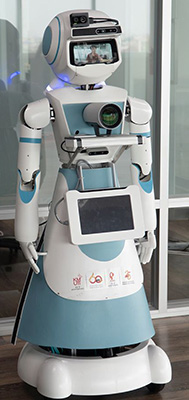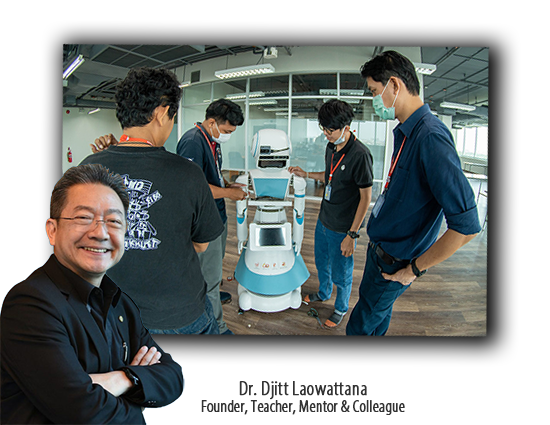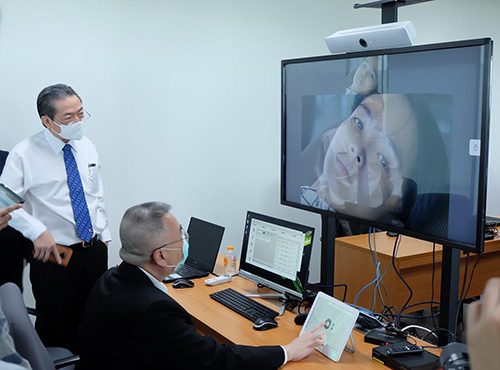
The Great Virus War of 2020
Service Robots Head to Pandemic’s Frontlines
Meet FACO: New Breed of AI-Powered, Multi-Tasking Service Robots
“FIBO intends to collaborate with international friends to fight COVID-19.
This is a battle between virus dominance and the human race.
We must fight.”—Dr. Djitt Laowattana
Founder & Director, The Field Robotics Institute (FIBO)
King Mongkut’s University of Technology, Thonburi, Thailand (KMUTT)
Service robots battle pandemic
We’re hip deep in the Great Virus War of 2020, and any time we can get a service robot to switch out with a human on the front lines, let’s do it! The problem there is that, in the multi-billion-dollar business that is the professional service robotics industry, there are very few service robots that can take on the necessary jobs.
Of course, any help is better than humans stretched to physical and mental exhaustion valiantly performing round-the-clock pandemic duty. The dull, dirty, and dangerous jobs meant for robots are, on the front lines of the Great Virus War, still being performed by humans, at great personal peril to themselves and their families.
To be fair, a few service robots are contributing to the war effort.
The Danes have a mobile, UV disinfection robot that can kill off a roomful of viruses in a flash; the Chinese have robots that autonomously spray disinfectant and others that can assist at gathering patient info. Beijing-based robotics company CloudMinds sent 14 robots to the COVID epicenter of Wuhan to clean and disinfect, deliver medicine to patients and measure patients’ temperatures. Other service robots worldwide do similar jobs.
Unfortunately, none of the existing crop of service robots seem to be more than just adequate, if that. Nice to have around, but certainly nothing remarkable.
What then about a service robot that is mobile, autonomous, can sort the infected from the healthy, is totally impervious to the deadly disease, is AI-enabled and sensor rich enough to examine patients, take thermal temperatures, analyze chest x-rays and 3D CT-scans, tele-connect patients to physicians, and act as a remote, high-def diagnostic probe for medical staff? In short, a service robot that can make a real difference. One that can meaningfully impact the well-being of both patients and healthcare workers alike.
Then get ready to meet FACO, the new face of service robotics (see video).
FACO is an acronym for FIBO  Against COVID, with the acronym FIBO standing for the place where FACO was designed and built: The Field Robotics Institute (FIBO) at King Mongkut’s University of Technology, Thonburi, Thailand (KMUTT). FIBO is world famous for its robotics, even more so in Asia. It’s boss, and the impresario of FIBO’s COVID-fighting robots, is Dr. Djitt Laowattana, a brilliantly driven and inspirational roboticist, known as The Father of Thai Robotics.
Against COVID, with the acronym FIBO standing for the place where FACO was designed and built: The Field Robotics Institute (FIBO) at King Mongkut’s University of Technology, Thonburi, Thailand (KMUTT). FIBO is world famous for its robotics, even more so in Asia. It’s boss, and the impresario of FIBO’s COVID-fighting robots, is Dr. Djitt Laowattana, a brilliantly driven and inspirational roboticist, known as The Father of Thai Robotics.
A sense of Laowattana can be seen in his working tirelessly to quickly round up nearly two dozen contributing sponsors in order to build FACO, and with his generosity in offering the finished COVID-fighter for purchase…at cost! “I prefer not to make profit during this pandemic,” he said in an interview. Probably no one supplying robots to the COVID cause can claim to be as equally magnanimous.
Medical leaders and IT managers from Bangkok’s hospitals got a demo and immediately placed orders; and the government of France called about a partnership ASAP. And it’s still very early on; the first FACO just came on line and will go into hospital duty in mid-April. Near and far, word is getting out that FACO is a special kind of robot. Profit, maybe even gouging, is easily had when people and their countries are desperate. But it seems that’s simply not the FIBO way.
For Laowattana, the cause is what matters most. It’s what guided him in the founding of FIBO in 1995. Twenty-five years on, his benevolence and brilliance have steered his every action, and are now deeply ingrained within FIBO’s culture.

How FIBO made FACO
FACO didn’t pop up out of thin air; a service robot named SOFA preceded FACO, which was quickly converted to provide heavy duty service for the pandemic. FIBO has been building robots for over two decades; SOFA was the latest iteration before the hurry-up move to convert it.
Here’s how FIBO describes their latest SOFA iteration: “SOFA is a service robot for telemedicine, with a monitor displaying a treatment record and/or diagnosis results directly from the hospital’s information system; physicians can remotely command SOFA from a centralized control center to travel to designated areas.
“SOFA is also equipped with a thermal camera to monitor a patient’s temperature, and a high definition magnifying camera which can zoom into patients as needed up to 20 times original size, allowing physicians to not only remotely check a patient’s general physical condition but to also utilize 20x magnifications for ultra-closeup exams.
“In addition, SOFA has a videoconferencing system to enable both patients and physicians to make video calls to each other in real time.”
With the threat of COVID-19 imminent, SOFA was service ready enough to enlist into the Great Virus War. The Field Robotics Institute then renamed SOFA as FIBO Against COVID (FACO).
Readying for a showdown
Across the entirety of the Thai medical and engineering communities, time was of essence. A national preparedness movement needed to start immediately. Thailand, from January on, was gearing up. Writing in a recent Forbes article, Dr. Kongiat Kespechara, Thai internist, CEO of Bangkok Hospital Eastern Group, and founder of Hospital OS, a globally-used, open-source management software for hospitals and clinics, states he knew that the health infrastructure of Thailand was inadequate to deal with the epidemic.
So too, he added, were the infrastructures of nearby Laos and Cambodia. Resources were extremely limited. Hospital OS created an online system to monitor Thai citizens self-quarantining at home, while also using it to raise an army of volunteers to reinforce health infrastructures. Laowattana’s FACO, with its FIBO-engineered system platform, will became an ideal partner to bolster the anti-virus defense perimeter.
“We plan to deploy the robots in three hospitals,” he said following a recent demo: “Ramathibodi Chakri Naruebodindra Hospital, Chulalongkorn Hospital, and Queen Sirikit National Institute of Child Health.”
FIBO engineers designed the SOFA/FACO outer plastic shell and had it manufactured locally. Form Synthon (Thailand) Co. provided IT expertise to help build out the system’s platform; Inceptra and a Hauwei Diagnostics System perform AI analytics on X-ray films and CT-Scans; and Cisco Systems (Thailand) Co. donated the video conferencing and ultra-high-definition camera/video system.
Initially, FACO will be connected to each hospital’s Wi-Fi system. However, in the future, Laowattana plans to deploy 5G cloud computing: “We plan to make it possible for the robots to support 5G connections via TOT Public Company’s 2600-megahertz and 26-gigahertz spectrum ranges, as well as leverage cloud computing to reduce costs,” he reports.
Speaking of costs, the FACO prototype totaled out to be $133,000 (4 million Thai baht); subsequent FACO service robots are anticipated to run about half that of the prototype. FIBO used its own funds pulled from other projects in order to finance FACO, and also received financial support and equipment from 21 companies to complete the first three machines.
Mass production of the FACO robot is in the works. With government support, FIBO, in conjunction with the Thai Automation and Robotics Association (TARA), plans to distribute the engineering plans to 20 manufacturers, with the goal to rapidly catch up with hospital needs for multi-function service robots for the front lines.
Anti-virus trio
In addition to FACO, Laowattana’s arsenal has two other FIBO service robots readying to join the anti-virus campaign (see videos).
The first is CARVER, an autonomous mobile robot (AMR)— the latest in FIBO’s CARVER Series. CARVER is specifically designed to autonomously deliver food, drugs and medical supplies to COVID-19 patients in hospitals. It can handle payloads up to 330 lbs. (150kg) or up to 30 food trays.
With LIDAR and 3D camera technologies, it can localize and navigate freely in hospital wards, hotels lodging self-quarantine cases, and at field hospitals. In addition, it is equipped with a hydroxyl generator for air purification, and viral disinfecting to sanitize hospitals around the clock.
Hydroxyls can oxidize contaminants, remove odors and disinfect bacteria and viruses from indoor air.
The second is a jury-rigged Temi (from Israel-based Roboteam). Think, an Amazon Alexa on wheels sporting a 10-inch screen for tele-medical video calls. FIBO staff have retrofitted the 20-pound, three-foot-tall Temi with cupholders and a tray to tote meals, medicine, and other supplies in non-critical operations.
The base model with microphones, speakers, and 60 sensors, retails from Roboteam for $1,900. With iApp’s Thai Voice OS, Temi can communicate in Thai; understanding Thai culture was added by FIBO engineers. A robot, in addition to speaking the native language that also understands the speaker’s ethnic culture, is a better robot, reasons FIBO.
COVID anniversary present
2020 was supposed to be a year in which to celebrate FIBO’s twenty-fifth anniversary (1995-2020), and for Laowattana, as its founding father, to bask in its brand-new, multi-million-dollar building with sweet labs and stacks of undergrad and grad students to teach, mentor, and to build robots with.
See related:
The Godfather of Thai Robotics
Thai Robotics & The Godfather’s Backstory
Thai robotics comes of age: The man who made it happen.
FIBO at KMUTT is the country’s only university to offer bachelors, masters, and doctoral degrees in robotics engineering and automation, so there’s lots for him to do and oversee on a daily basis.
COVID also intervened in FIBO’s celebrating its qualification for the global $10M ANA Avatar XPRIZE Competition, the only qualifying team from Southeast Asia to advance, joining other Asian powerhouse teams from India, Korea, and Japan in the race to bring home the XPRIZE.
The FIBO anniversary and XPRIZE celebration are totally muted by what’s at hand these days in the breakneck pace of producing service robots for the Great Virus War. As Laowattana puts it: “This is a battle between virus dominance and the human race. We must fight.”
With that, the scrappy roboticist has put his jubilation on hold until the final victory over COVID-19. After spending decades building robots to assist humankind, he reasons that there can be no greater challenge than to build a robot to save lives and to help change the course of a worldwide pandemic.
In that war, he, FIBO, and FACO are ready.
See related:
Speculative Robotics
Can Robot Sentinels Warn of Viruses?
Mobile robots bristling with sensor tech and AI—like an electronic “smart nose”—might provide early warning enough to prevent Wuhan-like disasters.

